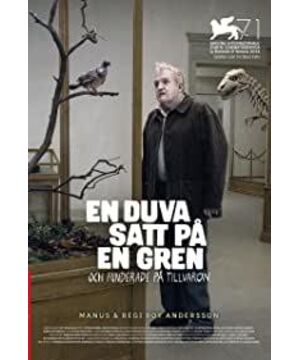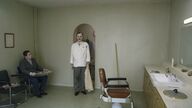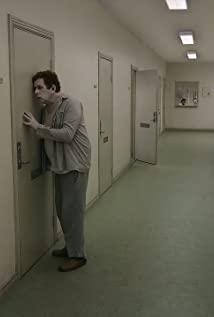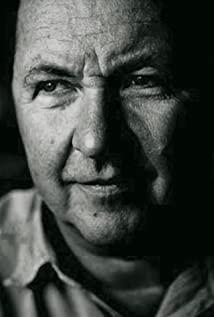"Quiet" was directed by Swedish director Roy Anderson. It was released in 2014 and won the 71st Golden Lion Award. The mainland translation of the film uses a four-character grid, which is very poetic, but its original meaning is not easy to see: a pigeon sitting on a branch thinking about the meaning of existence. The film uses 38 fixed scenes for a non-linear narrative of human nature, times and existence. The film uses group portraits to weaken the concept of the protagonist, giving it a real sense of record, but at the same time exaggerates the story, making it detached from reality, as if telling a film through the mouths of others. This puts the audience in the perspective of a "dove", as if every one of us watching the movie is the dove who observes the human world while thinking about the meaning of existence. Just like the man in the first shot looking at the stuffed bird in the museum, the thing itself can be seen more clearly only by placing oneself in a spectator's point of view.
Egoism prevails in a depressed life
In the second and third stories about death, the people around the deceased are indifferent and selfish towards the dying or the dead. Children rob their mothers of their inheritance, and strangers take food from others. People watch death with indifference and care only about what they can get. Just as the two toy salesmen related to each scene were in a physical condition, the woman who came to collect the payment said: "I don't care about your health, I only care about whether I can receive the payment." The instant death means With the end of a life, such a tragic thing should arouse people's empathy, mourning and memory together. In an ego-oriented society, everyone lives in tragedy, and life is a tragedy, so what is the death of others? When indifference, numbness, and selfishness have become the labels of everyone, no amount of joys and sorrows can make people empathize. The two toy salesmen went from selling to stagnation and then to parting ways, and their encounters with each other were a reflection of everyone's life. Those who are overwhelmed by the burdens of life can only repeat a "I'm glad to hear you are fine" greetings when talking to others to put a false mask on their messy lives, and talk with others. comfort. But such words that cover up cruelty will only make people farther and farther apart, and we are getting closer and closer to the word loneliness.
Three Ages of Death
The whole film uses fictional groups to reflect the appearance of groups in reality, and also depicts several different eras.
The first is the indifferent, twisted era in which most of the scenes are located. In this era, people are silent and indifferent to what is going on. For example, a flamenco teacher openly sexually harassed male students in a dance classroom with many students, but no one dared to speak up; the girl who proposed to recite poetry in the performance was forced by the male host to end the performance without starting the performance. The performance was performed, but the adults under the stage did not respond, and the children were allowed to run up and down the stage. It is said that an era belongs to a generation, and the people who survive in this era are already so dead, so isn’t this era also haunted by the breath of death?
The second is 1943 in the memory of the hearing-impaired old man in the tavern. Attractive waitresses sang "Song of Glory" to the young soldiers, and the team who wanted to exchange kisses for fine wine lined up from inside the tavern to outside the tavern. Unlike the lifeless atmosphere of the whole film, this scene is full of life. In the singing of "If you are drunk and have no money, you can replace it with a kiss", the era that belongs to the elderly has passed away silently. Now the taverns are full of people who come to buy drunk, and tell their sorrows and loneliness with wine. The passer-by who asked about the old man's condition said it very well. Fortunately, he couldn't hear clearly now. Fortunately, there was alcohol now. Otherwise, life would be so miserable. Perhaps for all living beings, the lively era of singing and dancing has died, but for the elderly, it remains vividly in the memory. He listened to the intoxicating and blurred singing with his tinnitus ears, recalled the past in the tavern, put on his coat and left when the glass bottomed out.
The third is the absurd and bizarre 18th-century time-travel in a bar. Carl rode his horse into the bar with arrogance, and took innocent young people as bed companions through the mouth of the adjutant. But the second time he walked into the bar it was a completely different scene. There were cries outside the bar, and the defeated soldiers rushed back to their hometowns in dismay; in the bar, Carl Twelve couldn't even borrow a toilet.
Who defines the meaning of existence
It is said that the director's intention to portray the scene of Karl XII's defeat in 1709 was to satirize the actions of later generations to portray Karl XII as a tragic hero and a great king. This makes people wonder who defines the meaning of our existence. According to existentialism, the meaning of each person's existence should be defined by himself. But is it really so? When we are born, our various life choices seem to be our own, but they are constrained by the rules of society. What kind of person we want to be and what kind of meaning we want our life to have is often not achieved at the end of life.
It is an extremely pessimistic concept to associate death from this. The several deaths depicted at the beginning of the film are very sudden and absurd. At night, the wife is cooking in the kitchen, and the husband can suddenly choke and die quietly when he opens a bottle of wine in the living room. The indifference and numbness of people in the face of the death of others, depicted in the latter two scenes, is even more chilling. The suddenness and indifference of death is so oppressive that it even seems a little funny against the background of upbeat music. For ourselves, we cannot define our own existence, and we are always prepared to face sudden death. For those who are indifferent, our death can no longer cause waves, so what is the meaning of our existence?
Looking back at a scene in the latter part of the film, a person asked the people around him what day of the week it was today. He felt that it was already Thursday, while everyone else said it was Wednesday. As the man on the far left said, these things are recorded by people, and if they don't record, people will mess up. We cannot but accept such a definition. Recording can indeed regulate our lives and keep things running on track. But on the human body, can this kind of record really define existence? It seems that records are also recorded by people, whether it is text, images or images, there is room for processing. And with the changes of the times, different records also have different types of interpretations, and existence also has different definitions with the changes of the times. Just like the record about Karl XII, this is also artificially depicted, artificially processed, and artificially defined.
Think of death in this way, and it becomes merely a natural phenomenon. Sadly, we cannot resist death, yet we have to accept it because it must come and can happen at any time. The meaning of death is defined by people, and whether or not to die has a different answer for each person.
View more about A Pigeon Sat on a Branch Reflecting on Existence reviews









